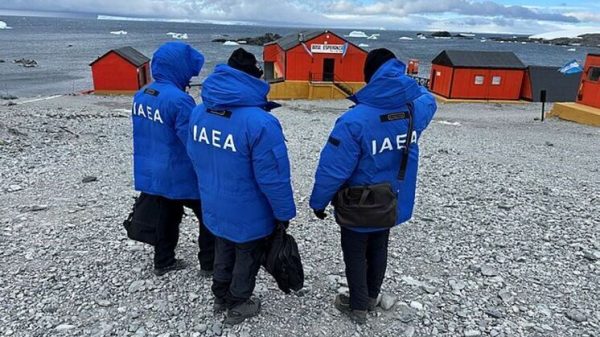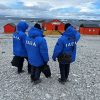Kylie Moore-Gilbert believes she never would have been sentenced to 10 years jail on spying charges in Iran if the Australian government had gone public with her case earlier to pressure Tehran.
The British-Australian academic – who was released after a little more than two years in a complex prisoner swap involving four countries – said the Australian government’s strategy of “quiet diplomacy”, deliberately shielding her case from the media, while pursuing negotiations with Iran’s government, was flawed.
In a television interview on Tuesday night about the 804 days she spent locked up inside Iran’s Evin and Qarchak prisons, Moore-Gilbert said: “Had my ordeal been made public, there’s no way I would’ve got 10 years.”
Kylie Moore-Gilbert thanks supporters after Iran prison release: ‘My freedom is your victory’
Read more
Once her case was made public around the world, “much greater attention was paid to my health and my condition”.
The dual citizen, educated at Cambridge and a lecturer in Islamic Studies at the University of Melbourne, was arrested in Tehran in September 2018 as she prepared to board a flight out of the country after attending an academic conference in Qom.
She was sent to Tehran’s notorious Evin prison, held by the Revolutionary Guards in the secretive Ward 2A, and sentenced to 10 years’ imprisonment on espionage charges in a secret trial. The Iranian government claimed she was a spy working for Israel, the country of her estranged husband’s nationality.
In her first sit-down interview after her release in November 2020, Moore-Gilbert revealed she had pushed for her story to be leaked to the media months before it made headlines, long after she was arrested.
Saying she was “not convinced the quiet diplomacy case stacks up”, Moore-Gilbert revealed she had urged her family to go public in one of the few brief phone calls she was granted inside the prison, but that it was “kept quiet”.
“I knew it was deliberately being kept out of the media against my wishes and from the first six weeks to two months I’d been … demanding to my family they go to the media,” she said.
“I’ve been told the media knew about my incarceration but [were] told by the government to keep it quiet … because the line being run by the government was they were trying to find a diplomatic solution behind the scenes with Iran.
Moore-Gilbert’s arrest only became public after two other Australians, Mark Firkin and Jolie King, were detained, nearly a year after her arrest. King and Firkin were released after three months in 2019.
“The line being run by the government was that trying to find a solution diplomatically behind the scenes with Iran was the best approach for getting me out and that the media would complicate things and could make Iran angry and piss them off and make things worse for me,” she said.
“I took a very different view of the situation based on my own experiences being inside there.”
Moore-Gilbert’s case was complicated by the fact that, inside Iran, she was held by the hardline Revolutionary Guards, less willing to negotiate than the Iranian government, represented by the foreign minister, Javad Zarif.
Asked about his government’s “quiet diplomacy” strategy, the Australian prime minister said the priority had been Moore-Gilbert’s safe return.
“Kylie Moore-Gilbert obviously can’t be aware of all the things the government has been involved in to secure her release over a long period of time, and the many other matters running over that period,” Scott Morrison said.
“And there are obviously things that sit within the national security dimension of what the government handles.
“There will be views on this matter, but what I know is that this was our top-priority consular case to get Kylie home.”
Moore-Gilbert said the Revolutionary Guards tried to recruit her as a double agent “many times” during the more than two years she spent as their prisoner, offering to free her if she “made a deal” with the regime.
She said she had rejected repeated entreaties from guards and officials to agree to spy for Iran in exchange for her immediate release.
Moore-Gilbert told Sky News she suspected the Iranians had wanted to “have their cake and eat it too” – receiving something from Australia through a diplomatic solution to her incarceration while also using her status as an academic to spy for Iran.
“I knew the reason they didn’t engage in any meaningful negotiations with the Australians was because they wanted to recruit me,” she said.
“They wanted me to work for them as a spy [and said] that if I cooperated with them and agreed to become a spy for them they would free me … that I could win my freedom [and] make a deal with them.”
In the interview, Moore-Gilbert spoke at length about the devastating psychological toll her time in the prison took on her mental health and, in particular, the first four weeks spent in solitary confinement.
She spoke about the “psychological torture” of being inside the small two-by-two metre cell, with lights on 24 hours a day and a “static sound” coming from the phone in the cell that she could use to call guards.
“After the two-week mark I was flipping out, I’d completely lost it, I’d lost the plot, I was completely crazy,” she said.
“At first I couldn’t eat anything and I couldn’t sleep. My emotional state was so volatile, I was so anxious, my heart beating was always beating heavily, I was basically having a prolonged anxiety attack or panic attack.”
After an initial period of daily interrogations, she said she would go stretches “when I was just alone in this room, locked in this room 23 hours a day with nothing to do, so I was by the end of it a crazy lady.”
Moore-Gilbert consistently denied the charges against her, the Australian government dismissed them as “baseless”, and no evidence has ever been publicly presented of her alleged crimes.
“I am an innocent woman,” she wrote in a letter smuggled out of prison last year, “imprisoned for a crime I have not committed and for which there is no real evidence.”
She again denied the charges during her Sky News interview on Tuesday, calling them “ridiculous”. The academic said she had drawn strength from the anger she felt being imprisoned on false charges.
That anger pushed her to “fight back” and “break the rules”. She estimated she went on seven hunger strikes during her incarceration and was beaten once after a doctor she had slipped a note to “betrayed” her and showed it to guards.
Australia refuses to confirm prisoner swap to get Kylie Moore-Gilbert out of Iran
Read more
She also revealed that on one occasion she managed to scale the fence of her exercise yard and climb on to the roof of the prison, where she considered trying to escape.
“I did contemplate [escaping] when I was up there because it took them 20 minutes to find me. [But] where would I have gone? What would I have done?
“I didn’t speak the language, I was in a prison uniform … without someone on the outside to help me … I don’t know what I would have done.”
Moore-Gilbert was ultimately released in a complex prisoner swap involving Australia, Iran, Israel and Thailand. The deal has never been acknowledged by Australia. Moore-Gilbert was freed in exchange for the release of three convicted terrorists. The men were involved in a calamitous bombing attack in Bangkok in February 2012 that aimed to kill Israeli diplomats but succeeded only in blowing up their own rented apartment and injuring five people. All three were in prison in Thailand.
Iranian state media showed footage of the three men receiving garlands of flowers, draped in the national flag, on their return to Iran.






















































Свежие комментарии